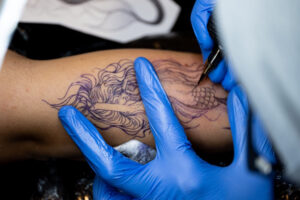 Do you want to make sure that your new tattoo heals properly and the colors remain nice and vibrant for the next couple of years?
Do you want to make sure that your new tattoo heals properly and the colors remain nice and vibrant for the next couple of years?
In that case right tattoo aftercare is essential! We always give you specific aftercare instructions, but if you need a reminder, here are the essentials.
In this article, we will tell you which creams you should buy to protect and repair your new tattoo and which to avoid.
Which types of creams do we recommend?
1. Bepanthen
Bepanthen is a water-based cream designed to moisturize and rejuvenate the skin. Its popularity lies in its lightweight texture, which some individuals find preferable to petroleum-based alternatives.
2. Easy Tattoo
Formulated to be hypoallergenic and developed specifically for tattoo aftercare, the tattoo cream hydrates and favours the restructuration of the skin barrier. It soothes irritations linked with tattooing. Tested under dermatological control, it offers an excellent skin tolerance. Does not stick or stain.
You can buy it right after your session at our studio or through our collaborating partner, CosmetiGo.
3. Natural skin regenerating balms
For smaller, more simple tattoos regenerating skin balms without chemicals can be an option. Creams that help wound healing, are antiseptic and reduce irritation, itchiness, pain, for example Almost 1.618 CICA + Ceramide regenerating cream or Viktoria Jilek’s intensive skin regenerating balm. You can also buy these at our studio or through CosmetiGo.
Are body lotions good for tattoos?
Not really. These products primarily focus on moisturizing and skincare rather than repair. Consider a tattoo as akin to a wound; applying body lotion to an open wound isn’t recommended. However, once it reaches the later stages of healing, you can use moisturizer to aid the process. Opt for fragrance-free options without irritating ingredients even during the later healing stages. Steer clear of products with exfoliating properties, as they may be too harsh for a healing tattoo.
Is coconut oil good for tattoos?
With caution. While extra virgin and properly produced coconut oil offers excellent skin hydration and natural antibacterial properties, it wasn’t specifically formulated for tattoo care and lacks testing regarding its long-term effects on tattoo longevity. Its relatively robust texture may pose challenges in complete removal at room temperature, particularly for individuals with sensitive skin.
Should I use any specific brand for tattoo aftercare?
It’s not a must, but the mentioned options are safe and effective. You can choose other products as well, in that case, you should consider the following criteria:
1. Gentle and Moisturizing
Prioritize products that maintain cleanliness and provide hydration without causing skin irritation for effective tattoo aftercare.
2. Fragrance-free
To minimize the risk of skin irritation, it’s generally advisable to opt for fragrance-free products during the healing process.
3. Free of harsh chemicals
Steer clear of products containing harsh chemicals or exfoliating properties, as they can be overly abrasive for a healing tattoo.
4. Non-comedogenic (non-pore-clogging)
If you are prone to acne or have oily skin, select products labeled as non-comedogenic to prevent pore blockage.
How should the cream be applied?
Be sure to use a small amount of ointment, spreading it thinly and sparingly. Applying too much can result in problems like clogged pores and hindered healing. Prior to application, always wash your hands to avoid introducing bacteria to the tattoo.
Guide to a fast healing tattoo
Refrain from exposing the tattoo to direct sunlight, swimming pools, hot tubs, or excessive moisture until it’s completely healed. If you have any concerns or observe signs of infection, seek advice from your tattoo artist or consult with a healthcare professional.
More information on healing your tattoo can be found under ‘Tattoo aftercare’.

